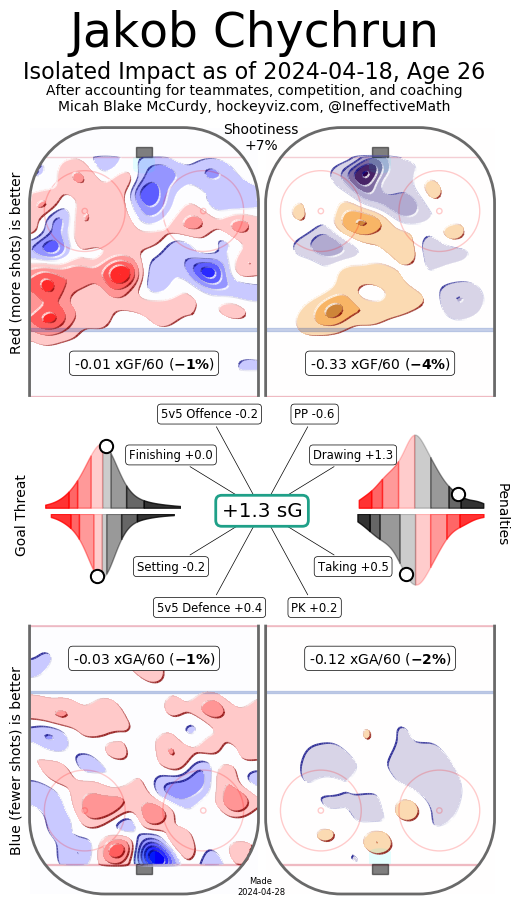Ottawa Senators Report Cards: Jakob Chychrun
Ottawa's big deadline acquisition last season had some rough patches in his first full year with the Senators

Reader Grade: B-, Staff Grade: B-
In yesterday's write-up of Jake Sanderson's season, Ross mentioned that for all of the season's disappointments, Sanderson's remarkable glow-up was one of the rare bright spots. Today we turn our attention back to one of the year's bitter disappointments: Jakob Chychrun.
In a vacuum, a B- grade from both the readers and the staff might not seem so bad. But if the Ottawa Senators were ever going to be serious about play-off contention in 2023-24, they needed Chychrun to be a difference-maker. He was not that, much to our chagrin.
That's not to say his season was totally devoid of positives: Chychrun, who has long struggled to stay healthy, played 82 games in a season for the first time in his career and generally appeared to be extremely fit throughout the campaign. He tied his career-high in points with 41. There were moments when he looked very much like the missing piece on the Ottawa blue line.
The negatives, however, were hard to ignore: Ottawa was out-shot, out-chanced, and badly out-scored when Chychrun was on the ice this past season. The Sens allowed 24 goals more than they scored at 5v5 with Chychrun, the second-worst mark on the entire team (bonus points if you can guess who was worse without looking it up). Here's how Micah McCurdy's Hockeyviz saw his season:

Without absolving Chychrun of all responsibility for his feeble results, the difference between his time spent at 5v5 with Jacob Bernard-Docker (his most common partner at 433 mins), and literally anyone else, is stark:
Chychrun with JBD: 46.60 CF%, 41.50 xGF%, 37.50 GF%
Chychrun without JBD: 50.39 CF%, 49.38 xGF%, 44.05 GF%
Basically, his pairing with Bernard-Docker was absolutely calamitous, while his results with anyone else were passable. It's unfortunate that Thomas Chabot missed so much time with injury, because although the pairing was not without their own challenges, they were regularly winning the shot and chance battle. The theory in Ottawa at the start of the season went that between Chychurn, Sanderson, Chabot, and Artem Zub, the Sens would have two great pairs. They ended up with one great pair (Sanderson + Zub) and another pair that didn't play together much due to healthy problems, but also struggled at times even when they were both in the line-up. The success of the Sanderson and Zub pairing was so great that, even with Chychrun flailing, it never really made much sense to try to break them up. As he was not exactly given the strongest partner for the biggest chunk of his ice-time, some of Chychrun's difficulties are excusable.
At the same time, I have never seen an NHL defenseman who plays as aggressively as Chychrun. His pinching to keep pucks in at the offensive blue line, and his propensity to jump into the rush, border on reckless. Let it never be said of Chychrun that he does not force the issue: when everything works out just right, it can seem like everything he touches goes in the net. Chychrun started the season by notching nine points in the first ten games, was +2, and was just generally driving a whole tonne of offense. When the bounces stopped going his way, though, all of that assertiveness instead came back to bite: maybe a puck got by him at the blue line, allowing the opposition an odd man rush. Maybe the opposing goalie made a save on the Sens' rush, and with Chychrun trapped up ice, the Sens would be out-numbered as the puck went the other way. His play in the defensive end was similarly likely to produce either great outcomes (a clean strip of the puck to jump-start a counter-attack) or grade A chances against.
This volatility of outcomes is at the core of who Chychrun is as a player, and it makes it very hard to know what to make of him. When he is going good, he is an impactful player, but when the bounces are not going his way – look out. Given that Chychrun just turned 26, and that he has played eight seasons in the NHL, it seems unlikely that he will change who he is as a player; the walking embodiment of "live by the sword, die by the sword"
Which brings us to the question of his future in the nation's capital. Chychrun has just a year left on his contract before he can become an unrestricted free-agent, and his end-of-year media availability certainly left many wondering if he was interested in staying in Ottawa on a long-term basis. Do the Sens dare trade Chychrun after what has to be considered a disappointing season? Would that constitute selling low? There's a decently compelling argument to be made that Sens' management should simply hold onto Chychrun to start the season, and hope that pairing him with someone that isn't Jacob Bernard-Docker will bring his performance back in line with what the team needs.
On the other hand, it's difficult to imagine a scenario where all three of Sanderson, Chabot, and Chychrun are all paid in the area of $8M AAV. Is there a long-term fit for Chychrun in Ottawa even if he did want to be here? It's not hard to be captured by Chychrun's potential: anyone who watched this team for any part of the year probably has at least a couple of memories of him making some outstanding play. But to be winning hockey games, you need a lot more than potential; you need execution. If Chychrun does stick around, the Sens will be hoping for more from him than they got in 2023-24.



